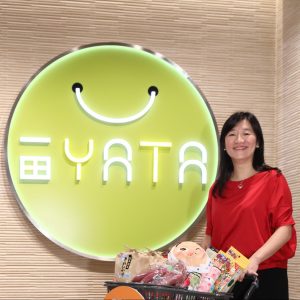Leading Businesses through Thick, Thin and COVID-19

With COVID-19’s impact still reverberating across the business and economic landscape, corporate leaders are striving to devise novel strategies to pivot, adapt and pursue new avenues for growth.
The Chinese University of Hong Kong (CUHK) Business School invited several outstanding alumni from some of the hardest-hit sectors to share their experiences. Hailing from the fashion, travel, retail, theme park and catering industries, these business leaders have been managing and mitigating the worst impacts of the pandemic (and prevailing). So how are they leading their companies in the mission to adapt to an ever-changing world? How are they preparing to recover, rebuild and reinvigorate for the post-pandemic new normal? And how has their training from CUHK Business School equipped them to tackle these unprecedented challenges?
Adapting to Shifting Customer Behaviour in Fashion Retailing
 One of the most profound changes to business has to be the seismic shift in consumer behaviour, something that the fashion retailing industry needed to contend with swiftly after the pandemic began. Hong Kong’s thriving fashion hub came to a standstill when foot traffic slowed, with a corresponding drop in in-person fashion shopping. This happened while online shopping boomed.
One of the most profound changes to business has to be the seismic shift in consumer behaviour, something that the fashion retailing industry needed to contend with swiftly after the pandemic began. Hong Kong’s thriving fashion hub came to a standstill when foot traffic slowed, with a corresponding drop in in-person fashion shopping. This happened while online shopping boomed.
At the time, Theresa Tang (EMBA 2020), Senior Director of Retail at Adidas, observed that many in the industry were still holding on to the hope that the pandemic would soon pass, instead of recalibrating their mindset or devising strategies to deal with the new reality. At the same time, she vividly recalled the professor of her marketing class stressing the need to formulate strategic adjustments when significant consumer behaviour shifts happen.
“Knowing this, we quickly realigned our business to the new customer journey. We started looking more into what customers look for and what kinds of promotions will appeal to them and adjusted our pricing, promotions and product strategies accordingly.”
Theresa says the digital knowledge she acquired from the programme, such as in FinTech, the shared economy and KOLs, also inspired her to leverage new platforms to drive sales, develop fresh promotion strategies and devise ways to revamp, improve and enhance her business. “Having this knowledge about the new economy has greatly enhanced our ability to adapt to changing customer behaviours. After all, businesses must evolve with the times to survive.”
Getting Ready to Fly Again in the Transformed World of Travel
 With international flights grounding to a halt and countries closing their borders or restricting foreign visitors, travel enthusiasts in Hong Kong found themselves unable to pursue their favourite activity. “This has devastated the travel industry. We even recorded negative revenue as customers cancelled their bookings,” says Rebecca Lao (BBA 2010), Market Insight Manager (Hong Kong and Taiwan) of a world-leading online travel platform.
With international flights grounding to a halt and countries closing their borders or restricting foreign visitors, travel enthusiasts in Hong Kong found themselves unable to pursue their favourite activity. “This has devastated the travel industry. We even recorded negative revenue as customers cancelled their bookings,” says Rebecca Lao (BBA 2010), Market Insight Manager (Hong Kong and Taiwan) of a world-leading online travel platform.
To drive revenue growth, Rebecca says her company had to pivot and turn their focus to local consumers. The company has since refocused its operations to cater to local demand through activities such as staycations and is preparing for the implementation of upcoming travel bubbles.
Rebecca adds it is crucial to maintain an innovative mindset in order to stay agile and competitive in business. “One of the most important skills I learnt from business school is to maintain an innovative mindset.” She adds the many group projects and business case competitions that she participated in helped her to hone her ability to work with different teams to develop ideas and tackle evolving business challenges.
“We must learn what travellers want and offer relevant information and services to address their needs or concerns. We need to give them the peace of mind to travel again.”
Maintaining the Right Attitude in Retail
 The decline in visitor numbers has thrown the retail industry into disarray. While it is one of the biggest department store chains in Hong Kong, Yata has also had to adapt quickly to changing market dynamics brought on by the pandemic. Fortunately, while sectors that depend on tourist consumption have been under stress, those that sell necessities, such as Yata’s supermarkets, have seen business surge.
The decline in visitor numbers has thrown the retail industry into disarray. While it is one of the biggest department store chains in Hong Kong, Yata has also had to adapt quickly to changing market dynamics brought on by the pandemic. Fortunately, while sectors that depend on tourist consumption have been under stress, those that sell necessities, such as Yata’s supermarkets, have seen business surge.
Susanna Wong (BBA 1992), CEO of Yata Limited, says maintaining the right attitude is crucial to navigating changes of any kind. “The retail industry is continually evolving. You must stay positive and make the most of every situation despite the uncertain outcome. In addition to strategic decision-making, always remember to make incremental progress and continuous improvements. That is what management is about.”
In tackling the challenges, Susanna sought both reference and guidance from the foundational theories and business cases she learnt in business school. She says the theories offered her a theoretical framework and a starting point to assess situations logically and react quickly. “Although management is ultimately about managing dynamics and managing people, you still need to approach management logically.”
Susanna says the current environment is unlikely to improve very quickly or suddenly return to normal. It is therefore best to make use of this time to prepare and build capabilities. “This way, when normalcy returns, you will be in the best position to capture opportunities.”
Reinventing the Theme Park Experience for New Lifestyles
 Tourism is one of the industries that was struck the earliest and the hardest by the pandemic. Vanishing tourists and months of government-mandated business closures brought tourist attractions like Ocean Park to a near-complete shutdown.
Tourism is one of the industries that was struck the earliest and the hardest by the pandemic. Vanishing tourists and months of government-mandated business closures brought tourist attractions like Ocean Park to a near-complete shutdown.
Rose Yeung (MBA 2002), Marketing Director of Ocean Park, knew the company could not simply stand still and wait. It was important to devise new ways to attract overseas tourists and local visitors and position the theme park on a better trajectory to recuperate once business activities resumed.
Recognising the local demand for places to relax and the global demand for physical and mental wellness activities, Ocean Park developed a series of initiatives that takes advantage of the park’s extraordinary setting. This included “green” staycations, “glamping” (upmarket camping), to hiking and yoga classes, all of which were very well received.
Rose credits both her MBA training and the network she developed at business school for helping her navigate the headwinds. “Perhaps even more important than the skillsets and business models I learnt was the network I cultivated. We inspire one another with insights and experiences from different industries and confront the COVID-19 challenge together.”
Rose expects when tourists do eventually return, they will have different demands and expectations, such as favouring more wellness and outdoor activities. “This will be a good opportunity for everyone to re-examine and rethink how they can address the evolving tastes and behaviours of local and overseas visitors.”
Catering to New Dining Habits
 F&B is another sector that has been pummelled by the cascading effects of the pandemic. Winona Lo (EMBA 2019), Executive Director of Fuk Yuen Group, a well-known catering chain, says the demand for catering services and facilities has plummeted since February 2020. The evolving anti-pandemic regulations, shifting consumer behaviour, along with intensifying competition among industry players are also directly compressing bottom lines.
F&B is another sector that has been pummelled by the cascading effects of the pandemic. Winona Lo (EMBA 2019), Executive Director of Fuk Yuen Group, a well-known catering chain, says the demand for catering services and facilities has plummeted since February 2020. The evolving anti-pandemic regulations, shifting consumer behaviour, along with intensifying competition among industry players are also directly compressing bottom lines.
As she steered her business through the COVID-19 fallout, Winona drew strength from the analytic skills, agile mindset and expansive network that she cultivated during her study. She says the ability to grasp the crux of situations and access to insights and experiences of alumni in different industries have been invaluable to her and her business.
“For example, while we anticipated restaurant diners’ numbers to dwindle, we also recognised that the demand for F&B would hold steady given the dining habits of Hong Kong consumers. So we pivoted, offering takeaways and ready-to-cook meals for in-store and online purchases. In the process, we expanded our business from Chinese catering and branched out laterally.”
Winona expects that the changes to the catering industry’s ecology will be permanent. “The world is transforming so rapidly. All the three-, five- or even ten-year strategic plans that we typically make can no longer catch up with the shifts in consumer behaviour or digital transformation.”
To prevail, she advises staying ahead of consumer behaviour changes and enhancing customer engagement. “Know your competitive advantages, leverage data analytics and adapt to new consumption patterns.”
The CUHK Business School Advantage
Indeed, no matter whether it is consumers changing how they shop and engage with brands or companies developing new ways to work and manage operations, digital transformation has become increasingly crucial to business competitiveness and continuity in the post-COVID new normal. Explore your career possibilities in a digitally transformed world with CUHK Business School’s programmes now!
This article is first published by the Alumni and Corporate Affairs Office at CUHK Business School.

